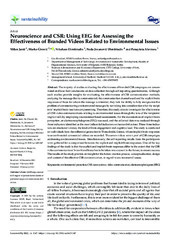Please use this identifier to cite or link to this item:
https://rfos.fon.bg.ac.rs/handle/123456789/2369| Title: | Neuroscience and CSR: Using EEG for Assessing the Effectiveness of Branded Videos Related to Environmental Issues | Authors: | Janić, Milan Ćirović, Marko Dimitriadis, Nikolaos Jovanovic Dimitriadis, Neda Alevizou, Panayiota |
Keywords: | video communication;neuroscience;environmental protection;electroencephalogram (EEG);CSR | Issue Date: | 2022 | Publisher: | MDPI, Basel | Abstract: | The majority of studies evaluating the effectiveness of branded CSR campaigns are concentrated and base their conclusions on data collection through self-reporting questionnaires. Although such studies provide insights for evaluating the effectiveness of CSR communication methods, analysing the message that is communicated, the communication channel used and the explicit brain responses of those for whom the message is intended, they lack the ability to fully encapsulate the problem of communicating environmental messages by not taking into consideration what the recipients' implicit brain reactions are presenting. Therefore, this study aims to investigate the effectiveness of CSR video communications relating to environmental issues through the lens of the recipients' implicit self, by employing neuroscience-based assessments. For the examination of implicit brain perception, an electroencephalogram (EEG) was used, and the collected data was analysed through three indicators identified as the most influential indicators on human behaviour. These three indicators are emotional valence, the level of brain engagement and cognitive load. The study is conducted on individuals from the millennial generation in Thessaloniki, Greece, whose implicit brain responses to seven branded commercial videos are recorded. The seven videos were a part of CSR campaigns addressing environmental issues. Simultaneously, the self-reporting results from the participants were gathered for a comparison between the explicit and implicit brain responses. One of the key findings of the study is that the explicit and implicit brain responses differ to the extent that the CSR video communications' brain friendliness has to be taken into account in the future, to ensure success. The results of the study provide an insight for the future creation process, conceptualisation, design and content of the effective CSR communication, in regard to environmental issues. | URI: | https://rfos.fon.bg.ac.rs/handle/123456789/2369 | ISSN: | 2071-1050 |
| Appears in Collections: | Radovi istraživača / Researchers’ publications |
Show full item record
SCOPUSTM
Citations
6
checked on Nov 17, 2025
Page view(s)
22
checked on Dec 28, 2025
Download(s)
2
checked on Dec 28, 2025
Google ScholarTM
Check
Altmetric
This item is licensed under a Creative Commons License


